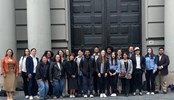HOI research | Pioneering revenue models for digital servitization: a comprehensive framework for value capture
(The image displayed above was generated using the artificial intelligence program Midjourney.)
Introduction: the digital transformation of manufacturing
Manufacturing companies are currently undergoing a digital transformation, launching innovative, digitally enabled service offerings. These "digital services" represent a shift in business logic, moving from upfront product sales to advanced service contracts. This shift has significant implications for cost structures, risk management, and revenue streams, challenging manufacturing companies to rethink their value capture strategies.
Designing new revenue models for digital services
A new research paper, "Revenue Models for Digital Servitization: A Value Capture Framework for Designing, Developing, and Scaling Digital Services," presents a comprehensive framework for designing new revenue models for digital services. The researchers conducted a multiple case study of 11 companies to enhance knowledge on this topic. The results reveal a highly customer-centric, iterative, and agile process where close collaboration with key customers during the early stages guides the framing of revenue models for digital services.
The framework: key phases and activities
The research paper presents a revenue model design framework that outlines key phases and activities. This framework carries implications for the emerging literature on digital servitization and the business model innovation literature. It provides practitioners with hands-on advice on how to implement the design, development, and scaling processes for revenue models in the context of new digital services.
About the researchers
The research team comprises:
- Lina Linde (Ph.D., in entrepreneurship and innovation at the Luleå University of Technology, Luleå, Sweden). Her research interests include servitization, digitalization, business model innovation, and strategic management.
- Johan Frishammar, a Professor in entrepreneurship & innovation with the Luleå University of Technology, and a Research Fellow with the House of Innovation, Stockholm School of Economics, Stockholm, Sweden. His research interests include circular economy, innovation measurement, business model innovation, innovation platforms, and sustainability transitions.
- Vinit Parida, a Professor of entrepreneurship and innovation with the Luleå University of Technology, and a Visiting Professor with the University of Vaasa, Vaasa, Finland. His research interests include organizational capabilities, servitization, business model innovation, digitalization of industrial ecosystems, and the circular economy.




